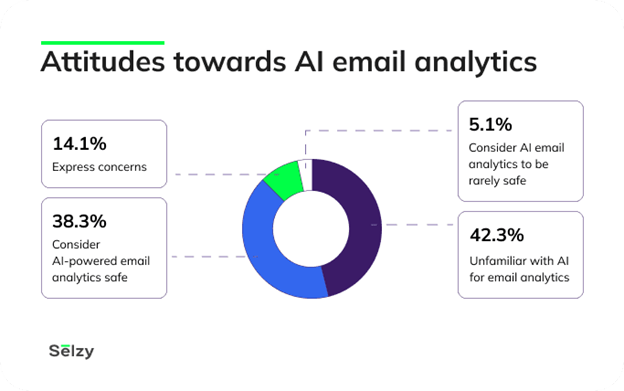Staying ahead of the curve is essential to stay competitive in today’s fast-paced world. As technology gets more advanced, data volumes continue to grow, and consumer expectations evolve, the role of AI in marketing is nothing short of transformative.
For email marketers, artificial intelligence (AI) is reshaping the way businesses engage with their customers, nurture leads, and drive conversions.
Understanding AI in Email Marketing
Before we dive into the game-changing aspects of AI in email marketing, let’s clarify what we mean by “AI.” Artificial intelligence refers to the simulation of human intelligence processes by machines, particularly computer systems. AI plays a crucial role in email marketing by automating and optimizing various aspects of the process.
Stats to Prove the Power of AI in Email Marketing
The adoption of artificial intelligence (AI) in email marketing has been on the rise, transforming the way marketers plan, execute, and analyze their email campaigns.
- 95% of marketers who use generative AI for email creation rate it “effective”, with 54% rating it “very effective.”
- 43% of marketers who use generative AI say that it’s most helpful for creating emails.
- 38% of marketers who use AI use it to write emails.
- Revenue increased by 41%, and CTR increased by 13.44% for marketers who utilize AI for email personalization.
- 21% of sales professionals who use AI in their role say that it’s most useful for writing messages to prospects. 32% say it’s most useful for re-purposing messages by adapting them to a different audience.
- 77.5% of business executives use AI to personalize marketing emails.
- AI-written email subject lines increase open rates by 5-10%.
- 58% of marketers are confident that AI can improve email newsletters.
- 51% of marketers find AI more effective than traditional non-AI approaches in email marketing.

- 38% of marketers consider AI-powered email analytics safe to use.

5 Strategies for Using AI in Email
1. Hyper-Personalization
AI enables marketers to create highly personalized email campaigns by analyzing user behavior, preferences, and past interactions. This level of personalization results in significantly higher engagement rates and conversions.
Tips:
- Leverage AI-driven behavioral data to create highly targeted email content.
- Analyze past interactions, purchase history, and browsing behavior to understand your subscribers better.
- Craft personalized subject lines, product recommendations, and email content to boost engagement.
Predictive Analytics
AI algorithms can forecast customer behavior, such as predicting when a subscriber is most likely to make a purchase or which products they might be interested in. This enables marketers to send timely and relevant emails, maximizing their impact.
Tips:
- Utilize predictive analytics to anticipate customer behavior.
- For instance, if a customer usually purchases during a specific season or event, prepare email campaigns in advance.
- Use AI insights to send re-engagement emails to subscribers who have shown signs of disinterest.
Automated Content Generation
AI can generate content, from product descriptions to email subject lines, saving marketers time and effort. It can also A/B test variations to identify the most effective messaging. While AI can generate content, it’s essential to maintain a human touch.
Tips:
- Review and customize AI-generated content to ensure it aligns with your brand’s voice and resonates with your audience.
- Experiment with different AI-generated variations through A/B testing to optimize performance.
Segmentation and Targeting
AI can segment your email list more effectively than manual methods, ensuring that each subscriber receives content tailored to their interests and behavior.
Tips:
- Continuously refine your segmentation strategy using AI.
- Regularly update your customer profiles based on their behavior and preferences.
- Consider using dynamic content within emails to adapt the message based on individual subscriber data.
Optimizing Send Times
AI can determine the best times to send emails to maximize open rates and click-through rates based on historical data and user behavior patterns.
Tips:
- Use AI to analyze historical data and subscriber behavior to determine the best send times.
- Keep in mind that optimal send times can vary among different segments of your audience.
- Test and adjust your email send times periodically to maximize engagement.
Real-World Examples of AI in Email
Let’s delve into real-world examples of how AI is transforming email marketing:
- Netflix: Netflix uses AI to provide personalized recommendations via email. Their algorithms analyze your viewing history and preferences to suggest content you’re likely to enjoy.
- Sephora: Sephora uses AI to offer personalized product recommendations and beauty tips in their emails, driving higher engagement and sales.
- Grammarly: The writing assistant tool Grammarly uses AI to send weekly email reports, showing users their writing statistics and suggesting areas for improvement.
AI is truly a game-changer that empowers email marketers to connect with their audience on a deeper, more personalized level. By harnessing the power of AI, businesses can send targeted, relevant, and timely emails that resonate with subscribers and drive measurable results.






